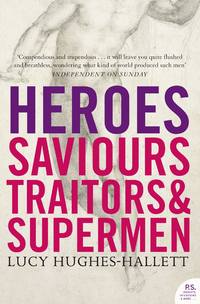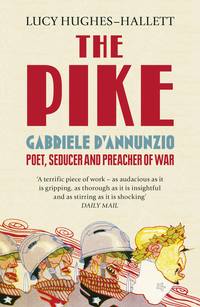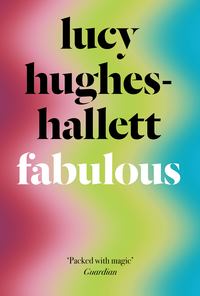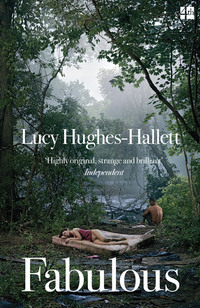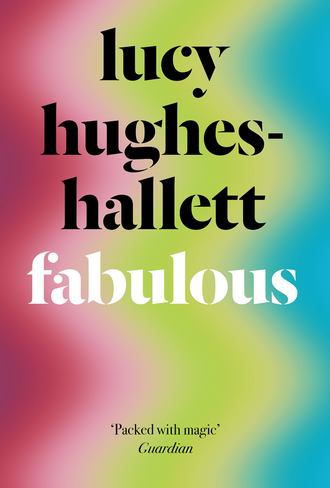
Полная версия
Fabulous
If it had been up to Eliza, it’s unlikely there would have been any kind of stink. She is a very self-contained and self-reliant person and I believe she would have dealt with the issue discreetly. She’d told me once, when another agent got their dirty little mitts on a prime site with planning permission that we should have had exclusive, ‘Not for me to butt in but, just saying … The only way to keep a secret is not to tell people. Not to tell anyone. You boasted about it, didn’t you, to some friend of yours who’s got nothing to do with the biz, so you thought it was safe?’
It was true. I had.
‘Remember,’ she said. ‘No one.’
So when she noticed the way Acton was hanging around she kept quiet, but one morning, when they were in the penthouse, her personal trainer saw that Acton was out on the roof terrace. Seeing. And Eliza didn’t say ‘Keep your mouth shut’ because that would only have aggravated the thing. And the personal trainer mentioned it to Diana, and that was that.
‘One’s not quite enough.
Two leaves you wanting more.
Three is a disaster.
Acton’s on the floor.’
He’d had his three caipirinhas but he was still upright, chanting that doggerel in the bar we all frequented. I took his arm and got him into the backroom where I’d been sampling a Chablis with a solicitor who shared my interests. Griddled scallops to go with. She was an attractive female solicitor, but there was no need for Sophie to know that. Anyway, she pissed off home as soon as Acton started hollering.
‘Get a grip,’ I said.
‘What’s to grip?’ he said, subdued now, maudlin. ‘I’ve got nothing to grip onto. I’m lost. All those bitches are coming after me now. View halloo. Tally ho. With super-bitch leading the pack.’
Diana? Eliza?
All or any of them. Acton’s self-pity had transformed all women into bloodhounds.
‘And which of you rotten curs is going to help me?’
I took him home. William was waiting by the door. I’d called him. ‘I don’t have a key any more,’ he said, ‘but if he needs me …’ We had to wrestle Acton’s key ring from him while he babbled out his grievances against the ungrateful world. William lifted him over the threshold and begun shushing him as a parent shushes a wailing brat.
So what had happened? There are, as there always are, several ways of understanding the story. All the variants added up to one thing. Acton had been where he should not have been. He had seen what he should not have seen.
Bluff no-nonsense version … Woman, imagining herself alone in an empty flat (except for personal trainer of course), takes shower. Man happens by and sees what he shouldn’t. Blushes all round. No harm done.
But it’s not quite that simple. For one thing, Eliza wasn’t alone in the shower. For another, she and the personal trainer had both seen Acton loitering on the roof terrace a couple of times before, around the time they came back from their evening run, so perhaps happenstance didn’t have that much to do with his being there.
Other versions were broadcast around the office in a babble of whispers.
‘William says they haven’t done it for, like, years.’
‘I mean it’s not a crime to like watching.’
‘Sex clubs, you have a whole room full of people, don’t you?’
‘That’s different. That’s consensual.’
There was the lubricious version: ‘I wouldn’t have minded an eyeful of that.’ The righteously indignant: ‘We owe it to all our female clients …’ The sheepish: ‘Well, come on – we’ve all had some fun up there.’ The collusive: ‘Best not rock the boat. I mean, good old Acton …’ The prurient: ‘What do you mean, on her knees?’ The legalistic: ‘Strictly speaking, they were all in breach of our agreement with Rokesmith.’ There were many variations on the creeped-out version. For everyone, suddenly, the picture of Acton, gloating over the entangled fauns, had ceased to be funny. And then there was the abject, frankly scared-shitless-of-losing-our-jobs afraid: ‘We have to tell Diana, don’t we? I mean if she hears and nobody’s spoken up …’
And then came the twist, ‘Haven’t you heard? Diana knows. Diana was there.’
There. Where? In the shower too? How? What doing? How positioned? On her knees?
To start with I imagined the trainer as one of those small-skulled, tremendously muscled, encouraging young men you see moving their clients’ limbs around in a physiotherapeutic kind of way in the park on a Sunday. When someone said, ‘No no, Doris is all-woman,’ the story’s significance suddenly switched. To watch a lusty woman having it off with an ideal embodiment of masculinity – that’s one thing. That’s to be a boy cheering on another boy at play. But to trespass into a women-only get-together, that’s different. That’s a no-no. That’s sweet poison. Imagine it. Three women. My mind swerves away.
William texted me: ‘Can we meet?’ When we did, he said, ‘I want you to know that Acton wasn’t a voyeur. Not that kind of a one anyway. I don’t think he ever even looked at porn. He didn’t want to watch sex. He just liked looking at bodies. At my feet, my hands, my elbows, the dip in my back, the way my neck meets my shoulders. He liked the look of naked flesh, that’s all.’
He seemed very agitated. It mattered to him that I understood. But to me peeping is peeping. I respected Diana. If she and Eliza, or she and the trainer, or all three together, were having it away, or not, that was their business. That wasn’t the point. The transgression was Acton’s.
One of the first things I learnt as a child was not-seeing. Shut your eyes and count to twenty. Shut your eyes and hold out your hands. Shut your eyes while Daddy’s undressing. Shut your eyes while I just … Don’t look until I tell you. Nothing to worry about. I’m just … Don’t look.
As I said, there are things from which I have chosen to avert my eyes, though they are – in a very profound and distressing sense – my own. Promiscuous looking – idly curious, lubricious, or simply appreciative – I see it as a pernicious liberty to take.
Diana called us in one by one. We were all intimidated by her, but we didn’t fully have her measure. We mistook her reserve for uptightness. She didn’t muck in, so we tended to ignore her, deferring instead to her chosen deputies, Acton among them. We hadn’t really understood how she’d run us. Now she showed her power.
She handed us teeth. She stroked our fingers until the claws grew. She stiffened our jaws until they clenched like pliers. She lengthened our spines and hardened our skulls and made our eyes into laser guns and our noses into missiles. She growled at us until we growled back, maddened by our own subservience. She let it be known that we were her pack now, and there was to be no mercy for mavericks. She invoked Rokesmith and the likely consequences of his displeasure – should anything go wrong in that direction – for our end-of-year bonuses. I squirmed and whined. I’m not proud of the way I behaved that week, the tales I bore to Diana as though they were duck she’d shot down and I was her retriever, the confidences I betrayed, the mean little niggling ways in which I tried to tell her that it was her hand I wanted fondling my ears and rubbing my tummy when I’d pleased her, that it would be her voice I obeyed when it told me to go fetch.
She said that Rokesmith had found a buyer for the penthouse. ‘Thanks to Eliza,’ she said. ‘Yes, she’s back in Sales. She’ll be heading up the team from next week.’ We got the picture.
Acton didn’t come in on Tuesday or Wednesday or Thursday, but Friday he was there again. ‘There’ll be one last party,’ said Diana. ‘In the penthouse. Before completion. Tomorrow in fact.’ When Rokesmith wanted something done, the lawyers got a move on.
Diana wasn’t there herself. She didn’t work weekends. Saturdays, she was in Richmond Park with her other hounds. She didn’t need to be present in person. She’d trained and instructed and starved us, and she’d showed us the lure with Acton’s scent on it.
It began with teasing. Acton was very smartly turned out. He wore one of those tight-buttoned shortish jackets that set off the amplitude of a man’s backside. All the better to sink your teeth into.
We all knew that one of the kids had been found dead in the gasworks. Overdose. You could have seen it coming. No one’s fault but her own, but still … We made jokes about gas masks and gaslight and gas chambers. They weren’t funny jokes. They weren’t meant to be. Acton laughed anyway. He was full of bonhomie. He could always turn it on.
He was onto the third caipirinha when he sensed the shift. He said something disparaging about a client, one we’d all had to deal with, one of those time-wasters whose idea of Saturday-morning fun is to go sightseeing around property way out of their price range. We didn’t laugh. It wasn’t that we liked the woman – she treated us all like she’d learnt at her mother’s knee that all estate agents are dishonest spivs whose vocabulary is risibly limited to words like ‘comprising’ and ‘utility room’. It wasn’t because we’d never jeered at her ourselves that we denied him his laugh. We kept quiet because we were all pointing, every sinew tight, each right-side forefoot lifted ready and each muzzle trained on the chosen prey.
Acton put his drink down and his eyes swivelled a bit. He struggled on with his anecdote. He mentioned a shower attachment. He uttered the words en suite. It was as though it was a code word, a command like Attaboy or Rats. Beneath our summer-weight jackets our hackles rose. We crowded him. We barged and jostled. We made a half-circle with Acton as Piggy-in-the-Middle, hemmed in, with the glass panels behind him, and behind them nothing but the purple air.
Mr Rokesmith seemed to rather relish the media coverage of Acton’s plummet, and of the party preceding it. An orgy, they called it, which was absurd. It’s not as though anyone’s clothes were off. ‘No harm done,’ said Rokesmith, ‘apart from the demise of your young friend. Sorry about that. Smart fellow.’
The sale went ahead. Contracts had been exchanged, after all. People who want to live on that stretch of river like to be reminded of the East End of their imagination, of opium dens and mutilated prostitutes and Ronnie Kray saying, ‘Have a word with the gentleman outside, would you, Reg?’ If you want Kensington, you know where to find it. But Wapping, well, it’s got a bit of a frisson, hasn’t it? Even if rowdiness at an estate agents’ office party doesn’t quite cut it in the glamour-of-evil stakes.
Diana assured the police we were all exemplary beings – docile, obedient, team-spirited. We weren’t charged with anything. We were good boys. We got our bonuses.
She still calls us her pack. We are still let out for exercise at lunchtime. We run together along the Embankment. Our muscles work fluidly beneath our elastic skins. We keep our heads low and our weight well forward. The little gizmos slung around our necks allow her to find us swiftly should we stray.
Our eyes switch sideways to check each other’s proximity – we don’t like to be isolated. We know the hindermost and the leader are both easy prey. Acton was our leader once. Look what happened to him.
PSYCHE
There was once a young woman whom no one wanted to touch. It’s not that she was ugly. No. The problem was that she was too beautiful by far.
Her skin was as smooth and matt as crêpe de Chine. You wouldn’t want to stroke her cheek for fear of rumpling it. Her hair was as lustrous as falling water and as black as squid ink. If you ran your fingers through it – or so the young men thought as they watched her walking to the library – you’d be afraid they’d come away coated in darkness or cut as by a million tiny wires.
She walked always with her shoulders back. Her hips swayed around the invisible plumb line which dropped from the crown of her head. Her centre of gravity was high, but securely poised. You couldn’t really picture yourself tumbling onto a mattress, giggling, with a girl like that.
You couldn’t see yourself kissing her, either, or blowing raspberries on her naked belly, or sucking her toes.
She was called Psyche.
Her parents were proud of her, but not as pleased as they supposed they ought to be. Their friends said, ‘You know what they’re like. I never know how many I’m cooking for.’ They said, ‘I haven’t seen him for days, hardly. He’s always in his room with that creepy friend of his. I’ve no idea what they do up there.’ They said, ‘She’s dyslexic.’ ‘He’s dyspraxic.’ ‘She’s anorexic.’ ‘We’ve tried counselling.’ They said, ‘I think they should do their own washing, don’t you? But you know. Sometimes, the smell …’ They said, ‘You’ve got to let them do it their own way, haven’t you?’
Psyche’s parents kept quiet. They really had nothing to complain about. Sometimes, at night, though, one of them would say, ‘Do you think Psyche’s all right? I mean, really?’ and the other would look out of the window, or pick a towel up off the floor, or neatly square off a pile of books, and then say, ‘Well, we’ve no reason to suppose that she isn’t, have we?’
They hadn’t. No reason at all. There was nothing wrong with Psyche. She was no trouble. It was just a bit funny the way that she had no friends.
The boys of the town were offended. They didn’t like a young woman to be so negligent of them. They swaggered about, these boys, their hair falling forward over their eyes, their tight trousers puckering around their ankles. Their boots were scuffed. Silver studs gleamed in their nostrils and gold hoops in their ears. They looked like desperadoes, but they were very easily upset.
The war memorial was their place. In the mornings they’d stand around it. They turned their collars up and smoked. Or they sat on the steps and ate bacon sandwiches, holding them carefully with both hands so that the brown sauce wouldn’t run out. They’d talk chorically, each one addressing all the others, each one adding a detail to the story they were telling themselves, mumbling, catching no one’s eye, with occasional barks of laughter. Then they’d scatter, to do whatever they each did by day, and when it was nearly dark they’d be back, waiting for the story to progress, waiting for the night’s episode to unfold.
Psyche saw them when she came out of the library. She said hello, pleasantly, to the ones she’d known at school, and walked on by.
The other young women passed in pairs or gaggles. They went noisily away up the side streets to shop for lip-balm or tights, or they settled in flocks around the tin tables outside the bar. They sat on each other’s laps when the chairs were all taken, and shared each other’s drinks – three, four, five straws converging in tall glasses full of ice-cubes and sliced fruit. They looked at the boys. The boys kept talking, and fiddled with their cigarette lighters. After a while one – the one whose leather jacket looked old and soft, its blackness whitened by scars – walked over to two girls coming back into the square with carrier bags, and he put his arm across the tall one’s shoulders, and her friend took her carrier bags without being asked, and the tall girl and the boy went away towards the river. That was the beginning of the night.
Конец ознакомительного фрагмента.
Текст предоставлен ООО «ЛитРес».
Прочитайте эту книгу целиком, купив полную легальную версию на ЛитРес.
Безопасно оплатить книгу можно банковской картой Visa, MasterCard, Maestro, со счета мобильного телефона, с платежного терминала, в салоне МТС или Связной, через PayPal, WebMoney, Яндекс.Деньги, QIWI Кошелек, бонусными картами или другим удобным Вам способом.


